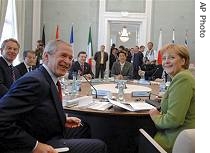2007年VOA标准英语-G-8 Leaders Reach Compromise on Climate Change;(在线收听)
Heiligendamm
07 June 2007
G-8 Summit host German Chancellor Angela Merkel says leaders have reached what she described as a substantial compromise on climate change, by agreeing on the need for substantial cuts in greenhouse gas emissions. But critics are calling it weak, as VOA's Sonja Pace reports from near the summit site at Heiligendamm, in northern Germany.
Speaking to reporters outside the conference center, Mrs. Merkel described the compromise as a major step forward.

German Chancellor Angela Merkel, left, next to US President George Bush during second working meeting at G8 Summit in Heiligendamm, 07 Jun 2007
Mrs. Merkel said G-8 members agreed to curb the rise of global warming gases and also agreed that substantial emissions cuts will be necessary. A strategy to achieve this is to be worked out within the United Nations for 2009.
Mrs. Merkel made global warming a cornerstone of this summit, but she failed to overcome U.S. reluctance to commit to reducing emissions by at least 50 percent by the year 2050. She said, however, that those specific goals would be under serious consideration.
Philip Clapp, president of the Washington-based National Environmental Trust, describes the compromise as weak.
"The only thing that President Bush was willing to agree to was that there should be a new treaty to replace the Kyoto Protocol when it expires in 2012 and that treaty should be negotiated by his successor in 2009," said Clapp. "He rejected every single substantive emissions reduction proposal, he even rejected proposals that the industrialized economies should improve the energy efficiency of their economies by 30 percent over the next decade and a half. The communiqué is fundamentally meaningless."
But British Prime Minister Tony Blair sees progress.
"Now we have an agreement that there will be a climate change deal, it will involve everyone, including America and China, and it will mean a substantial cut in greenhouse gas emissions and we are going to be, from a starting position, of considering the halving of emissions by 2050, which is a huge thing," he said.
Environmental advocate Philip Clapp says the one positive aspect is that even though President Bush refused to concede major points, he has paved the way for other G-8 leaders to begin to create a consensus on a new climate change agreement and then work on it with the next U.S. president.